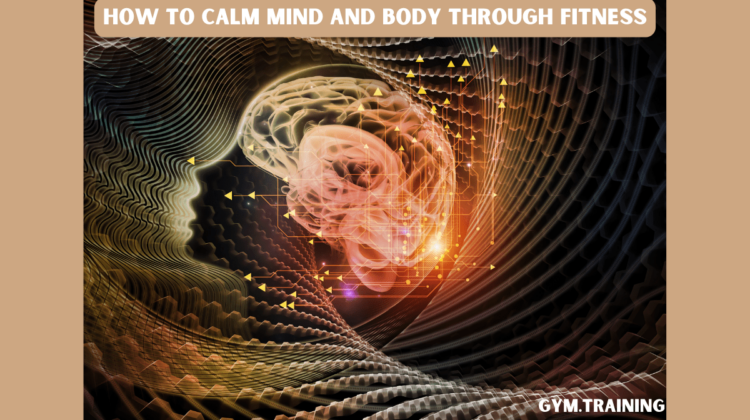
Can Mind And Body Be Related To Fitness?
The human experience is a delicate interplay between the mind and body, two entities deeply intertwined in shaping our existence. For centuries, scholars, philosophers, and scientists have grappled with understanding the intricate relationship between these aspects of our being.
While the mind is often associated with thoughts, emotions, and consciousness, the body encompasses the physical vessel that houses our existence. However, the demarcation between these realms is not as distinct as it may seem at first glance.
The ancient Greeks highlighted the significance of this connection through their holistic approach to health and well-being. Plato, for instance, regarded the mind and body as intimately linked components, believing that a healthy mind resided in a healthy body.
This philosophical viewpoint resonates even in modern times, forming the foundation of various holistic practices that acknowledge the influence of mental states on physical health and vice versa.
Advancements in scientific research have further illuminated the profound connection between the mind and the body. Neuroscientific studies have demonstrated how the brain, the seat of the mind, communicates with and regulates bodily functions.
The intricate network of neurons orchestrates the release of neurotransmitters, influencing not only our thoughts and emotions but also bodily processes such as heart rate, immune response, and hormonal balance.
Conversely, the body also impacts the mind in numerous ways. Physical activities, for instance, have been shown to have a profound effect on mental well-being.
Exercise releases endorphins, neurotransmitters that act as natural mood lifters, thereby alleviating stress and promoting a sense of well-being. Moreover, nutrition plays a pivotal role in cognitive function, with certain nutrients being essential for brain health and optimal mental performance.
The mind body connection becomes even more apparent in the realm of psychosomatic disorders, where psychological factors manifest as physical body symptoms.
Conditions like stress-induced headaches, gastrointestinal issues stemming from anxiety, or the exacerbation of skin conditions due to emotional distress highlight the intricate relationship between mental states and physical health.
Moreover, practices like meditation, mindfulness, and yoga emphasize the importance of aligning the mind and body to achieve overall harmony and well-being.
These practices not only promote relaxation and reduce stress but also enhance bodily awareness, fostering a deeper connection between the two. In our fast-paced, modern world, acknowledging and nurturing this symbiotic relationship between the mind and body is crucial for holistic health.
Cultivating mindfulness, engaging in regular physical activity, maintaining a balanced diet, and fostering positive mental states are pivotal in achieving an equilibrium between these interconnected aspects of our being.
Ultimately, recognizing the inseparable link between the mind and body allows us to embark on a journey towards comprehensive well-being. Embracing practices that honor this relationship empowers us to lead healthier, more fulfilling lives, where the synergy between mental clarity and physical vitality flourishes.
In essence, the mind and body dance in an intricate choreography, influencing each other in profound ways. Understanding, respecting, and nurturing this symbiotic relationship holds the key to unlocking the full potential of our human experience.
YOU MAY ALSO WANT TO READ: Gut Health And Its Impact On Overall Well Being
What Is Mind And Body Fitness?
In the pursuit of holistic well-being, the concept of mind and body fitness has emerged as a cornerstone for achieving a harmonious balance between mental clarity and physical vitality.
Unlike traditional fitness routines that focus solely on physical exercises, mind and body fitness encompasses a holistic approach that integrates mental, emotional, and physical aspects to achieve overall wellness.
At its core, mind and body fitness is about nurturing a synergistic relationship between mental and physical health. It emphasizes practices that not only strengthen the body but also enhance mental agility, emotional resilience, and spiritual well-being.
This comprehensive approach acknowledges the interconnectedness of the mind and body, recognizing that one significantly influences the other.
Mind and body fitness encompasses a diverse array of practices, each contributing uniquely to the attainment of holistic wellness. These practices encourage present-moment awareness, reducing stress, enhancing concentration, and fostering emotional well-being.
Regular meditation has been linked to improved cognitive function, reduced anxiety, and better emotional regulation. The benefits of mind and body fitness are manifold and encompass various aspects of human wellness. Physically, these practices enhance flexibility, strength, cardiovascular health, and overall fitness levels.
Mentally, they sharpen cognitive abilities, reduce stress, improve sleep quality, and promote emotional resilience. Moreover, they foster a deeper sense of self-awareness, encouraging individuals to cultivate a balanced lifestyle that aligns with their values and aspirations.
In our fast-paced, modern world, where stress and sedentary lifestyles are prevalent, prioritizing mind and body fitness is imperative. Incorporating these practices into daily routines empowers individuals to proactively manage stress, enhance overall health, and foster a profound sense of well-being.
In conclusion, mind and body fitness encapsulates a holistic approach to wellness that intertwines physical, mental, and emotional aspects. Through practices that harmonize these dimensions, individuals can attain a state of equilibrium where vitality, clarity, and inner peace converge, paving the way for a truly enriched life experience.
How To Calm Mind And Body Through Fitness?

In the midst of life’s whirlwind, finding moments of tranquility is essential for nurturing our overall well-being. Fitness, often associated with physical exertion, can also be a powerful tool to calm the mind and relax the body.
Incorporating specific exercises and mindful practices into our fitness routines can pave the way for achieving a serene balance between mental clarity and physical relaxation.
- Yoga for Harmony: Yoga, a centuries-old practice, is renowned for its ability to foster relaxation and mental calmness. Through a combination of postures (asanas), breathing techniques (pranayama), and meditation, yoga promotes flexibility, strength, and inner peace. Poses like Child’s Pose, Downward-Facing Dog, and Savasana are particularly effective in calming the mind and releasing physical tension.
- Mindful Movement with Tai Chi and Qigong: Tai Chi and Qigong, ancient Chinese martial arts, emphasize slow, deliberate movements synchronized with deep breathing. These practices not only enhance balance and flexibility but also induce a meditative state, calming the mind and reducing stress. The fluid motions and focused attention cultivate a sense of tranquility and inner balance.
- Breathwork for Relaxation: Incorporating specific breathing exercises (Link mentioned above) into fitness routines can significantly impact mental calmness. Techniques like diaphragmatic breathing or alternate nostril breathing help activate the body’s relaxation response, reducing anxiety and promoting a sense of well-being.
- Mindfulness in Motion: Activities like walking or running can be transformed into mindfulness exercises. By paying attention to the sensations of movement, the rhythm of breath, and the surroundings, these activities become opportunities to anchor oneself in the present moment, easing the mind and enhancing relaxation.
- Pilates for Body Awareness: Pilates, focusing on controlled movements and core strength, encourages body awareness and mindfulness. The deliberate, precise motions coupled with focused breathing foster a sense of calmness while improving physical strength and flexibility.
- Nature’s Soothing Influence: Engaging in outdoor fitness activities, such as hiking, trail running, or cycling amidst natural surroundings, offers a unique opportunity to calm the mind. Nature’s tranquility coupled with physical movement creates an environment conducive to relaxation and mental rejuvenation.
- Meditation for Inner Peace: While not strictly a fitness activity, meditation is a powerful tool for calming the mind and body. Incorporating meditation into a fitness routine, either before or after physical exercise, amplifies its benefits, promoting relaxation, reducing stress, and enhancing mental clarity.
ALSO READ: 6 Most Effective Meditation And Breathing Exercises
By integrating these practices into a fitness regimen, individuals can create a holistic approach to well-being that transcends mere physical exertion. Calming the mind and body through fitness not only enhances physical health but also nurtures mental serenity, resilience, and a deeper connection with oneself.
In the hustle and bustle of daily life, prioritizing moments of calmness through fitness practices becomes essential. Embracing these exercises as pathways to tranquility allows individuals to carve out moments of peace amid life’s chaos, fostering a profound sense of balance and well-being.

Leave a Reply
You must be logged in to post a comment.